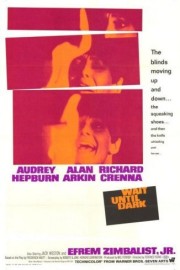Wait Until Dark
“Wait Until Dark”-less the 1967 film and more the Frederick Knott play it was adapted from-is one of my lasting moments of horror in my life. My mother took me to a production of it in Ohio. It was gripping stuff. But what really got to me was a key moment near the end (if you’re familiar with the story, you know the one); I was so frightened I was in tears afterward. That experience has stayed with me to this day.
Terence Young’s film adaptation doesn’t have quite the visceral impact of that formidable moment in terror, but damn is it good. From Henry Mancini’s music to Audrey Hepburn’s warm performance to Alan Arkin’s sinister exercise in acting menace, there’s a lot in this film that points at classic. While it’s not quite that great, it’s still a superb cinematic experience.
Hepburn stars as Susy, a young blind woman who is largely self-sufficient, but still finds herself vulnerable to life. Her husband has inadvertently come into possession of a doll filled with heroin. Three men, led by Alan Arkin’s mysterious Roat, enter her underground apartment looking for it.
The story is all suspense after Susy’s husband leaves for a job in Asbury Park, and the three men all find a way to make sure to get themselves into the apartment to look for the doll. From there out, all three play act a scenario that not only allows them to look for the doll and to keep Susy on edge. Mancini’s music, especially an out-of-tune piano motif that is masterful in its way to evoke mood, is a classic bit of horror-suspense scoring. And Young, who’d made three previous Bond films, keeps us on edge the whole way through, with Hepburn displaying both terror and strength as Susy in equal doses (she was nominated, deservedly, for an Oscar for the role), and Arkin, Richard Crenna and Jack Weston are fantastic villains.
Still, it all comes down to that climax. Susy runs around, fully aware of the danger she’s in, and breaks all the lights. She’s led the three on a wild goose chase to her husband Sam’s studio looking for the doll. She now has the upper hand psychologically speaking. Hepburn plays this brilliantly. No more games for anyone. And Arkin is pure evil when Roat takes control of the situation. And then, the final light goes out. How it plays out from there, well, you’ll just have to see for yourself. I wouldn’t dare give away what frightened me so as a child.










